Cecil and his companions head to a cave that leads back inside the Tower of Babil. Inside the cave, they encounter the survivors of the Eblan kingdom.
Eblan / Eblana
For years and years, I’ve always been confused – is the ninja kingdom in this game called “Eblan” or “Eblana”? Or is “Eblan” a descriptive word, sort of like how “American” describes something from “America”? It turns out there’s a good reason for my confusion all this time: the original English translation is inconsistent.
First, the name “Eblana” is used everywhere in Japanese. The castle is called “Castle Eblana” and the cave is called “Cave of Eblana”. NPCs also refer to the name “Eblana” and nothing else:
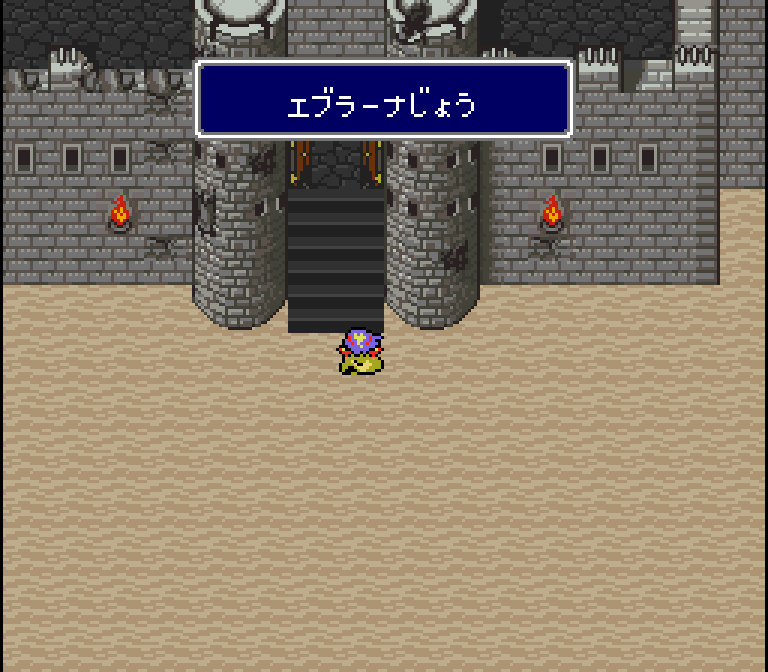 |  |  |
| 'Eblana' | 'Eblana' | 'Eblana' |
Meanwhile, in the original English translation, the castle is simply called “Eblan” while the cave is called “Cave Eblana”. Characters refer to the name “Eblan” and nothing else:
 |  |  |
| 'Eblan' | 'Eblana' | 'Eblan' |
In short, it seems that the cave is the only place in the original translation that retains the “Eblana” name – the name changed to “Eblan” everywhere else for unknown reasons.
Incidentally, it turns out that “Eblan” is the only name used in every translation of the game after the 1991 translation:
 | 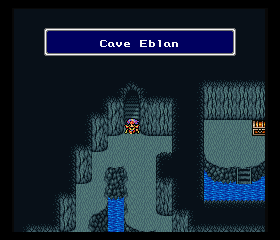 |
| PlayStation translation | PlayStation translation |
 |  |
| GBA translation | GBA translation |
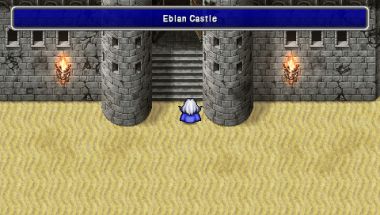 | 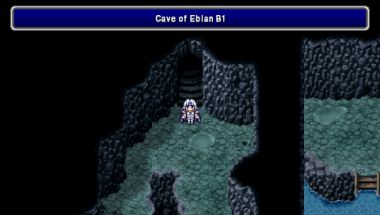 |
| PSP translation | PSP translation |
 |  |
| DS translation | DS translation |
So it looks like every other translation has jumped onto the “Eblan” bandwagon instead of “Eblana”. This seemed curious to me, so I checked the official Japanese data books and they all use “Eblana”. Even the super-detailed book with carefully spelled names spells it as “Eblana”:
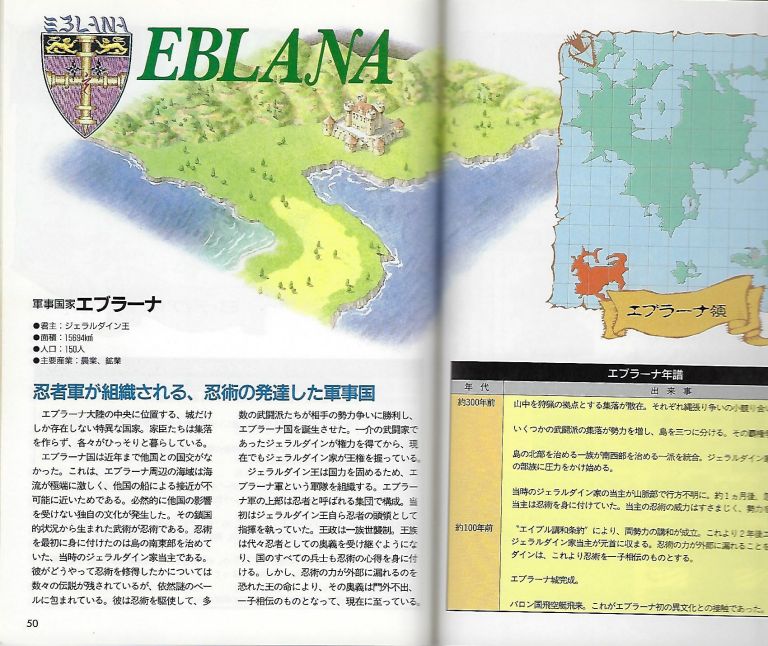
So I guess at some point the choice to call it “Eblan” in the English translations took hold. If I had to guess, the seed of this “Eblan” spelling began with the original translation and became solidified when the PlayStation translator was like, “Hey, why does the original game say ‘Eblan’ and ‘Eblana’? It should be one or the other!”
Regardless of the reason, the “Eblan” name has survived since the original translation, just as “Golbez” and “Spoony Bard” have survived all this time.
Entrance Guard
After passing through a monster-filled area in the cave, Cecil’s party reaches the undergound ninja settlement. A guard stands at the entrance:
 |  |
| Final Fantasy IV (Super Famicom) | Final Fantasy II (Super NES) |
In Japanese, this guard says, “Who’s there?! Oh, whew, you’re human!” He says the same thing in English, but in sort of the reverse: “Ah! Thought you were monsters!”
Trimmed Text
We’ve seen how the game’s translators had to shorten text in creative ways or drop certain bits of text altogether. This entire section of the game was hit especially hard by the scissors of editing – even short, simple words got trimmed until only the bare-bones information remained. Luckily, this part of the game is short and doesn’t heavily impact the main story, but here are a few examples of these “short cuts” in action.
First, this guard’s optimism and pride in the face of annihilation is missing in the translation:
 |  |
| Final Fantasy IV (Super Famicom) | Final Fantasy II (Super NES) |
| Japanese Version (basic translation) | English Translation |
| We are the proud people of Eblana! | We’re the people of Eblan. |
The urgency of the situation – and the important fact that very few survived Baron’s assault – is mostly missing in this translation:
 |  |
| Final Fantasy IV (Super Famicom) | Final Fantasy II (Super NES) |
| Japanese Version (basic translation) | English Translation |
| Those who managed to survive fled here. | We hid in here. |
This guard’s anxiety for the future remains mostly intact in this trimmed translation:
 |  |
| Final Fantasy IV (Super Famicom) | Final Fantasy II (Super NES) |
| Japanese Version (basic translation) | English Translation |
| Food is running low. | Food is running short… |
| Who knows how long it’ll last… |
This boy’s motivation feels weaker in the translation, possibly because he’s now only focused on one specific person and not two:
 |  |
| Final Fantasy IV (Super Famicom) | Final Fantasy II (Super NES) |
| Japanese Version (basic translation) | English Translation |
| I’m gonna protect my mom! | I’m gonna protect my mom! |
| She has my little brother or sister in her tummy! | She is pregnant. |
And this character’s confidence and desire for revenge is murkier in translation:
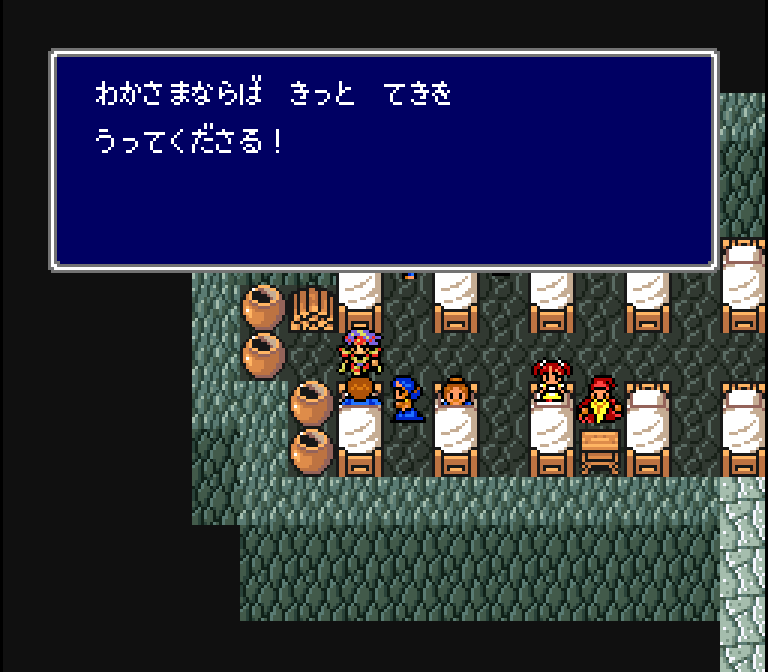 |  |
| Final Fantasy IV (Super Famicom) | Final Fantasy II (Super NES) |
| Japanese Version (basic translation) | English Translation |
| I have no doubt the Young Master will slay our enemies! | Our Prince can do it! |
Different Princes
In the English translation, everyone here refers to Edge as “the prince” or “Prince”. In Japanese, the word used is waka / waka-sama, which is sort of like our phrase “Young Master” in English:
 |  |
| Final Fantasy IV (Super Famicom) | Final Fantasy II (Super NES) |
“Prince” isn’t wrong here, but waka in this context evokes an image of a young lord in ancient Japan. This indeed fits with the ninja theme of this kingdom.
In contrast, the people of Damcyan refer to their prince as ōji, which is closer to the Western-style “prince” that we’re familiar with and evokes images of regal throne rooms and crowns and all that:
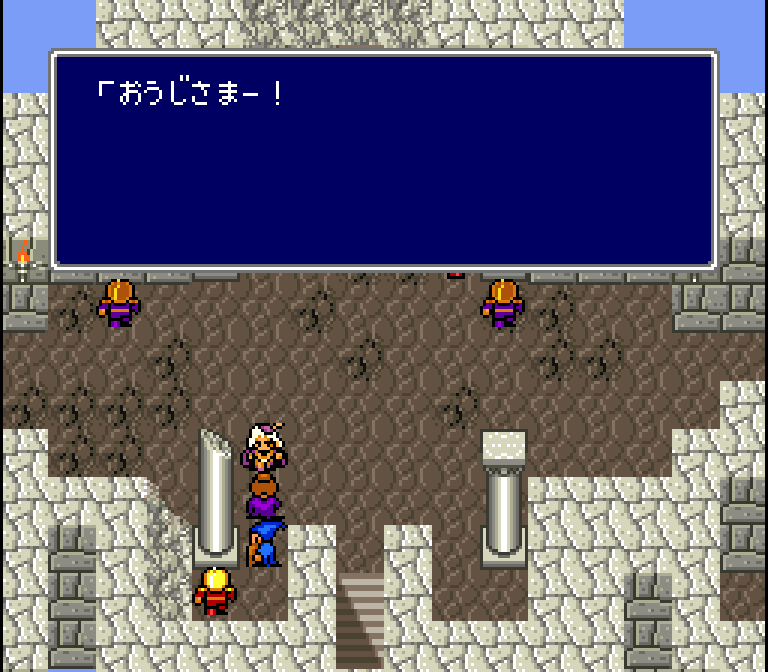 |  |
| Final Fantasy IV (Super Famicom) | Final Fantasy II (Super NES) |
Basically, I just wanted to point out that there are multiple types of “princes” in the game, but they get painted as one and the same in translation.
King & Queen News
A wounded soldier explains some recent events:
 |  |
| Final Fantasy IV (Super Famicom) | Final Fantasy II (Super NES) |
| Japanese Version (basic translation) | English Translation |
| While the Young Master was away, the king and queen were… | The King and Queen were taken when the Prince was gone! |
In the Japanese version, the fate of the king and queen is left unstated. It almost seems to suggest that they were killed – or at least abduction probably wouldn’t be the first thing most people think of. So when you encounter the king and queen later, it comes as a surprise – they’re not dead after all! But then that surprise turns to horror when you realize they’ve been changed into hideous abominations.
The English translation spoils the mystery and surprise, so you know you’ll probably meet the king and queen soon. Of course, the realization that the king and queen were turned into horrible monsters that just want to die is still tragic regardless of the translation differences.
Little Girl
A little girl talks about the prince:
 |  |
| Final Fantasy IV (Super Famicom) | Final Fantasy II (Super NES) |
| Japanese Version (basic translation) | English Translation |
| The Young Master said he’d beat up the bad guys for us! | The Prince will beat up those bad guys, right? |
| So we’ll get to go back to the castle soon, right? |
As with many other lines in this area of the game, a chunk of text has been lopped off. The girl’s text is also a bit different in English, but it’s nothing too noteworthy.
This line also contains a problem that plague’s this area’s text: titles like “Prince”, “King”, and “Queen” get capitalized when it’s unnecessary. This common mistake was fixed in the PlayStation translation and every later translation:
 |  |
| PlayStation translation | GBA translation |
Chamberlain / Senior Retainer
An old man in the refugee room has some important information:
 |  |
| Final Fantasy IV (Super Famicom) | Final Fantasy II (Super NES) |
| Japanese Version (basic translation) | English Translation |
| I am the senior retainer of Eblana. | |
| The Young Master has a foul mouth but is a kind person. | |
| He’s digging a passage to storm the Tower of Babil and avenge the king and queen. | To rescue the King and Queen, the Prince is digging a hole into the Tower of Bab-il. |
| But I haven’t seen him at all lately. | But I haven’t seen him lately… |
| Please don’t tell me he’s done something reckless again… |
Clearly a lot of text has been cut out here as well. Two main things surprise me:
- This guy’s self-introduction was dropped in the translation. I never really thought about it before, but it turns out this is the same old guy who runs around telling Prince Edge what to do all the time.
- The English translation changes things a bit and clearly spoils the fact that the king and queen were abducted and possibly still alive. The Japanese line simply implies that the prince is intent on getting revenge.
In Japanese, this old man also gives the player an idea of what to expect the prince to act like.
Treasure Changes
Many of the treasure chests in these caves were changed for the Easy Type and Super NES versions:
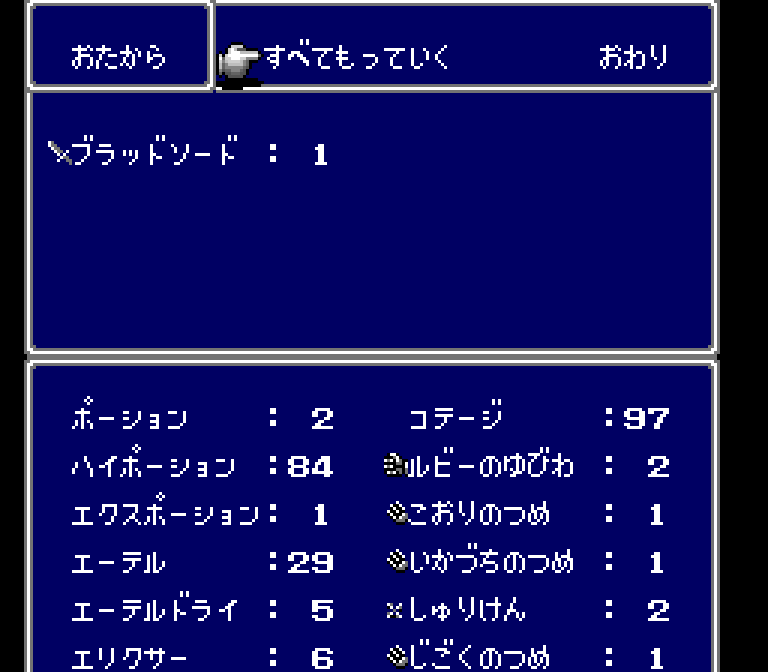 | 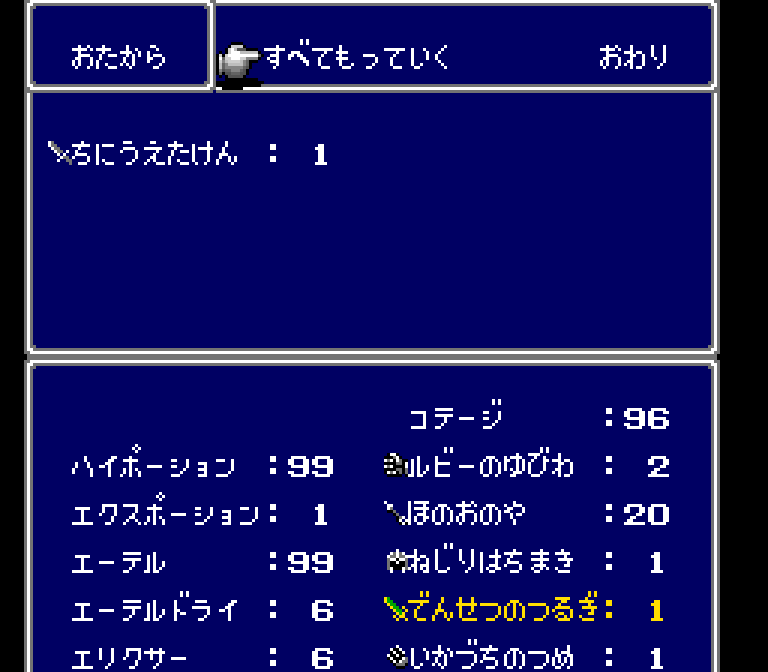 | 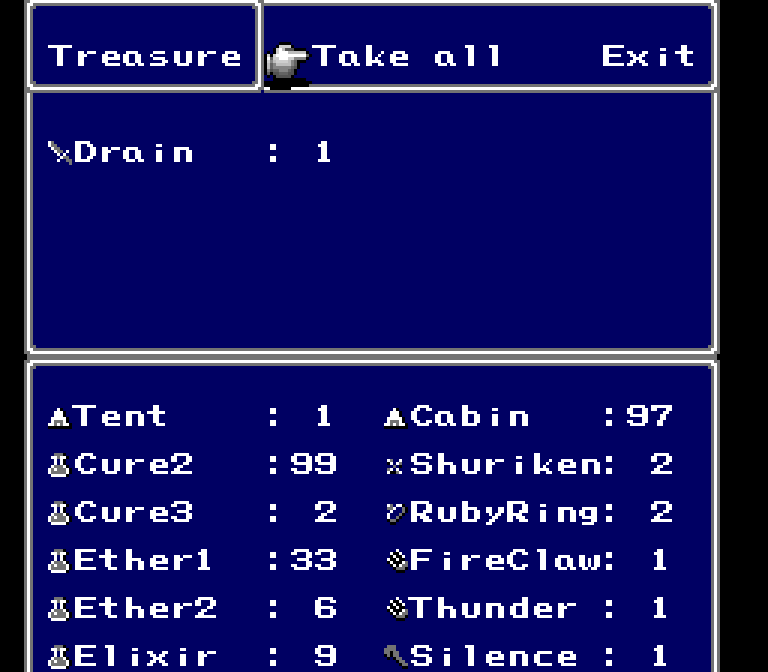 |
| Final Fantasy IV (Super Famicom) | Final Fantasy IV Easy Type (Super Famicom) | Final Fantasy II (Super NES) |
| Location: | Final Fantasy IV | Final Fantasy IV Easy Type | Final Fantasy II |
| B1F | Vampire Fang | 1200 Gil | 1200 GP |
| Path to Babil | Bomb Soul | X-Potion | Cure 3 |
| Path to Babil | Spider Web | 800 Gil | 800 GP |
| Path to Babil | Silver Hourglass | 850 Gil | 850 GP |
| Path to Babil | Gold Needle | Revive Medicine | Life Potion |
| Save Room | Blood Sword | Bloodthirsty Sword | Drain Sword |
The “Blood Sword” from the original game actually uses the English words “blood” and “sword”. It was renamed in the Easy Type version to have a 100% Japanese name that means “bloodthirsty sword” or “starving for blood sword”. Blood references were probably against Nintendo of America’s guidelines at the time, hence the change to “Drain Sword”.
Wounded Guard
 |  |  |
| Final Fantasy IV (Super Famicom) | Final Fantasy IV Easy Type (Super Famicom) | Final Fantasy II (Super NES) |
In the original Japanese version, a wounded guard says, “The Young Master went all by himself!”
For some reason, this exclamation mark was changed to a Japanese-style ellipsis in Easy Type. The English translation retains the exclamation mark, however, which vaguely points to the English translation (or at least this part of it) being based on the original Japanese script and not the Easy Type version.
I haven’t been keeping tabs on when the translation uses the original version as a base and when it matches up with the Easy Type version, but I’m starting to get the feeling it might’ve been a bit messier and less clear-cut than I originally expected.
Prince Edge Speaks
In Japanese, Prince Edge uses the rough, masculine pronoun ore to refer to himself. On top of that, he adds the name suffix -sama to his own name, which is as arrogant as you can possibly get.
These two language markers get lost in translation, so the very first English scene with Edge lacks the same “oh, okay, this is a really rude and masculine guy who also has a huge ego” punch that’s found in the Japanese script:
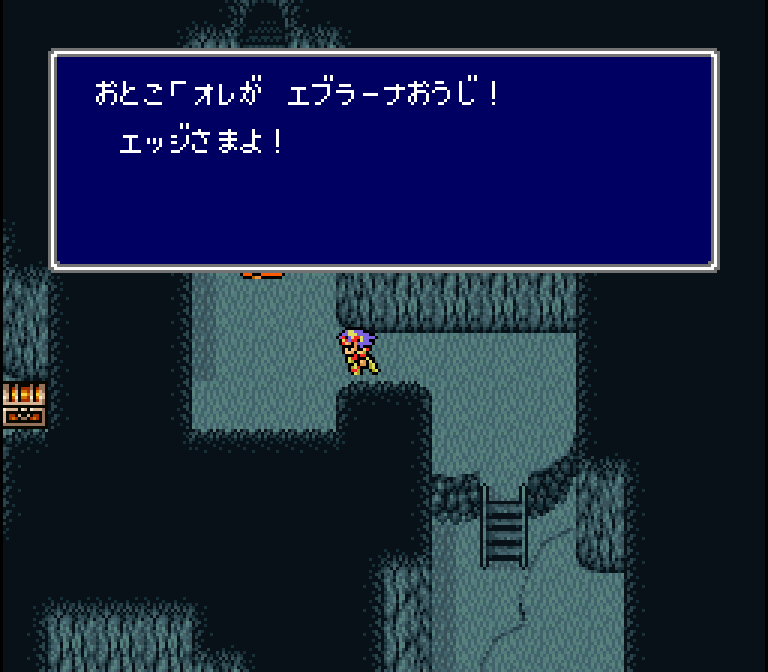 |  |
| Final Fantasy IV (Super Famicom) | Final Fantasy II (Super NES) |
We also see that Edge calls himself ōji here. This suggests that ōji and waka are fairly synonymous in the world of Final Fantasy IV after all, although my gut instinct tells me that a waka probably wouldn’t refer to themselves as waka in most situations anyway.
Rubicante Battle #1
A battle scene begins between Rubicante – one of the four elemental fiends working for Golbez – and Prince Edge. Edge is angry and wants revenge for his parents. He unleashes a special fire technique on Rubicante, but it causes little damage. In response, Rubicante taunts Edge and uses a devastating fire attack of his own:
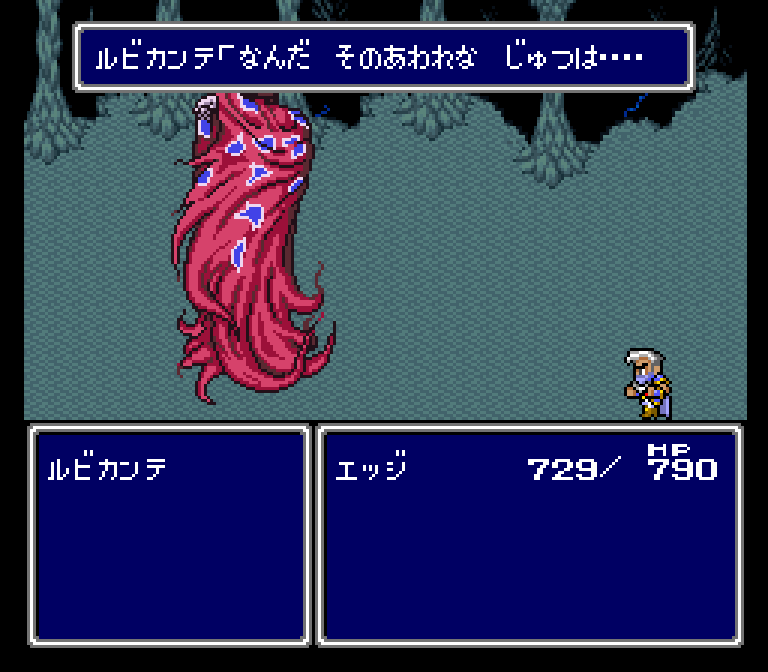 | 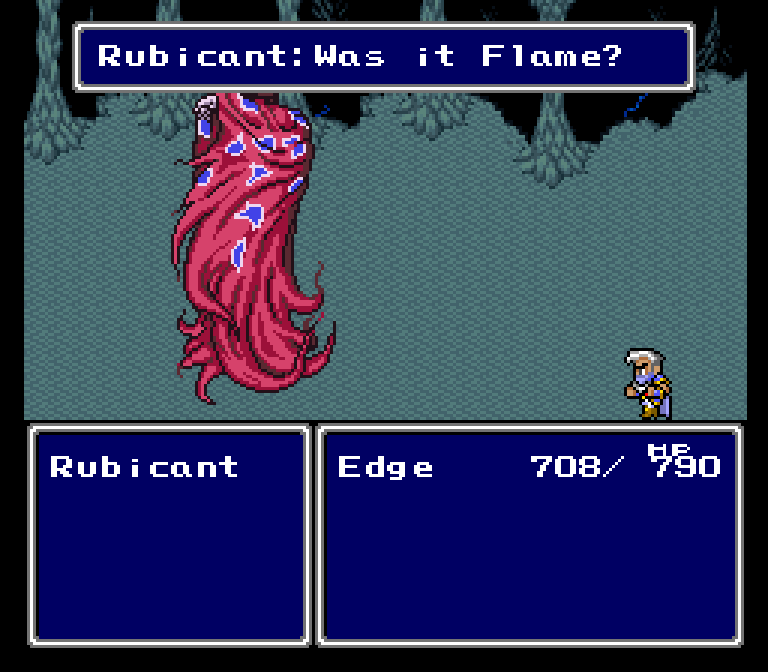 |
| Final Fantasy IV (Super Famicom) | Final Fantasy II (Super NES) |
The translated dialogue during this battle was trimmed a lot because battle dialogue can only fit in one line at a time:
| Japanese Version (basic translation) | English Translation |
| Edge uses his fire attack, which is “Fire Bomb” in Japanese and “Flame” in English | |
| Rubicante: What was that pathetic technique? THIS is how you use fire! | Rubicant:Was it Flame? I will show you how! |
Glare / Kaenryū
Rubicante then uses a powerful fire technique of his own that nearly kills Edge:
 |  |
| Final Fantasy IV (Super Famicom) | Final Fantasy II (Super NES) |
In English, this technique is called “Glare”. In Japanese, it’s known as かえんりゅ (kaenryū, "Flame ???").
Unfortunately for us, kaenryū uses hiragana instead of kanji in all the original releases, ports, remakes, spinoffs, and crossovers of Final Fantasy IV. As a result, the intended meaning of kaenryū remains ambiguous in Japanese. The most likely meanings are 火炎流 (kaenryū, "Flame Current") and 火炎竜 (kaenryū, "Flame Dragon").
Here are more examples of the hiragana-only かえんりゅ (kaenryū) in later spinoff games:
Normally, you’d expect something like this to get written in kanji once game consoles got more powerful, but it’s remained in hiragana for nearly 30 years now!
Edge is Defeated
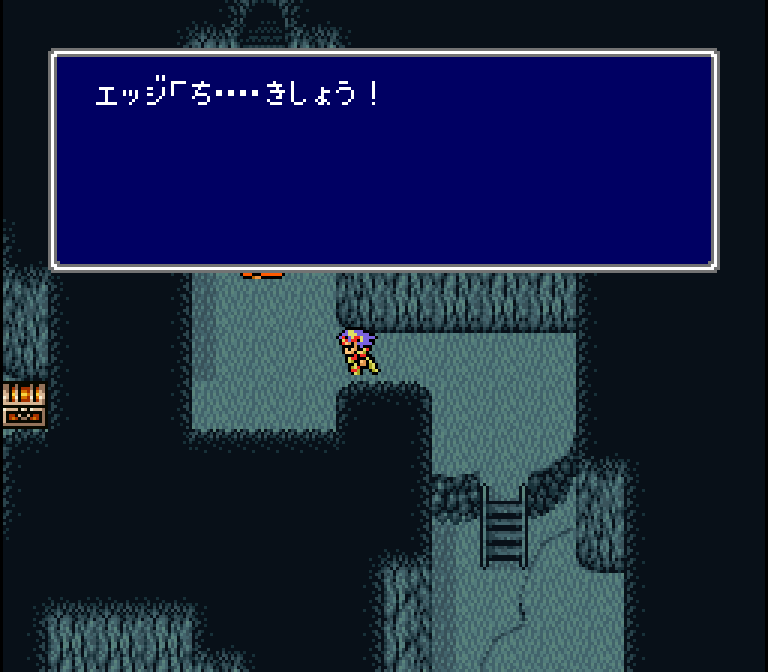 |  |
| Final Fantasy IV (Super Famicom) | Final Fantasy II (Super NES) |
After Edge is defeated, he shouts a rough equivalent of “D… Damn you!” in Japanese. In fact, “damn” is an extremely common translation for the Japanese word used here, chikushō.
In the English translation, this became “Blast… you!”. Something about the way it’s presented and phrased here makes me think that it might’ve originally had “damn” in there during pre-release scripts but was revised to “blast” before the final release, similar to some of the other pre-release content changes we’ve seen before, such as the removal of “blood” in the Agart observatory.
Rubicante leaves. Cecil and his friends go to Edge’s aid:
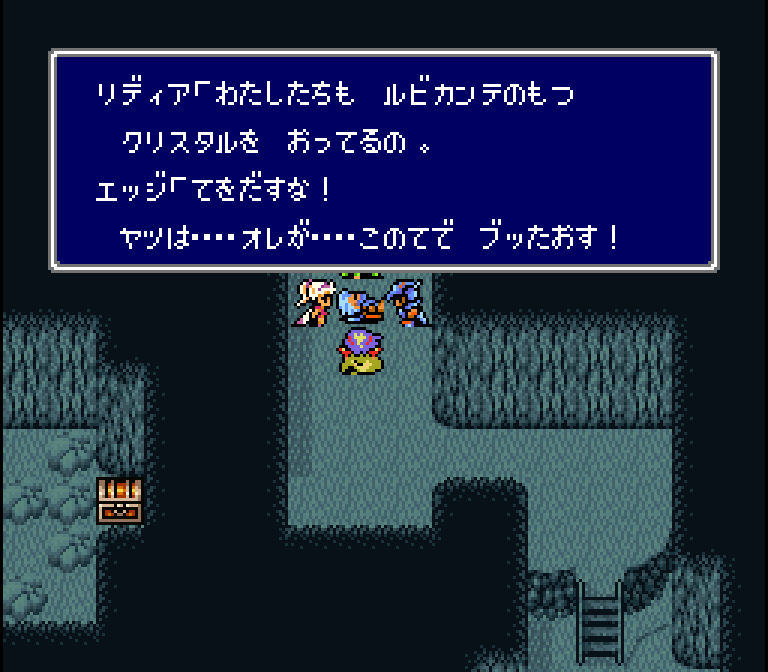 | 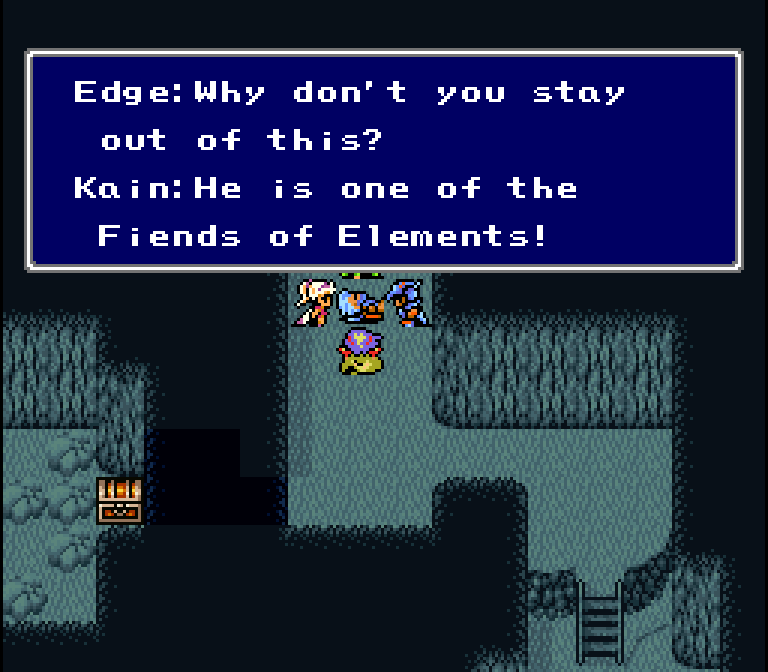 |
| Japanese Version (basic translation) | English Translation |
| Edge: Stay out of this! | Edge: Why don’t you stay out of this? |
| I’M… gonna slaughter him… with my own two hands! | |
| Cain: This is one of the Four Heavenly Kings you’re talking about, Prince. | Kain: He is one of the Fiends of Elements! |
| Cecil: You saw how strong he was first-hand! | Cecil: Haven’t you tasted enough of his power!? |
| Edge: Heh… Don’t mistake me for some spoiled little prince. | Edge: Think I’m just a spoiled prince, huh? |
During this piece of the full scene, two things stand out:
- A violent line was removed from the English translation.
- Cain calls Edge ōji in this scene. Edge responds by saying he’s not some pampered ōji. From this, we can probably assume that only the citizens of Eblana will use the waka term to refer to Edge – everywhere else in the world it’s probably going to be ōji.
There are three lines in this scene that were changed for the Easy Type release too.
In this first example, we can see how the word おうぎ (ōgi, "big technique / grand technique") in the original script was replaced with the word わざ (waza, "technique") in the Easy Type script:
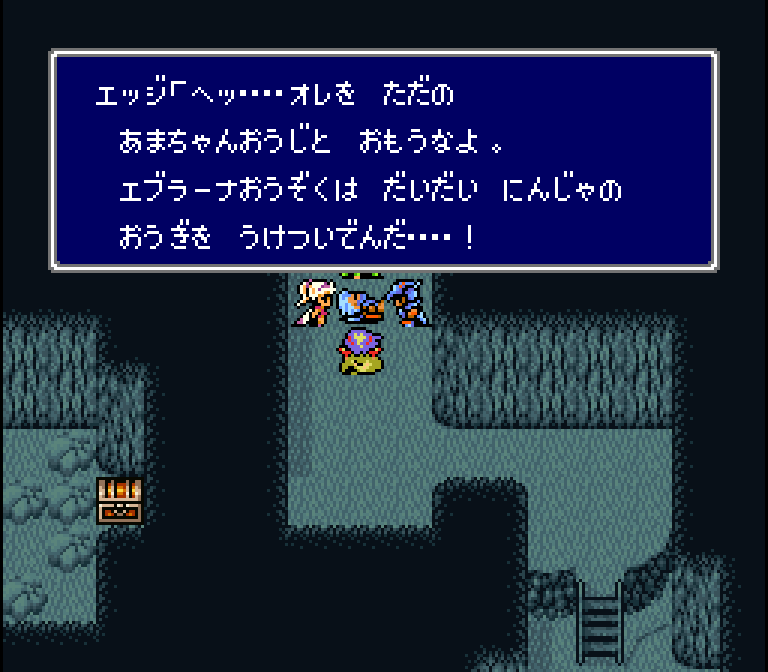 | 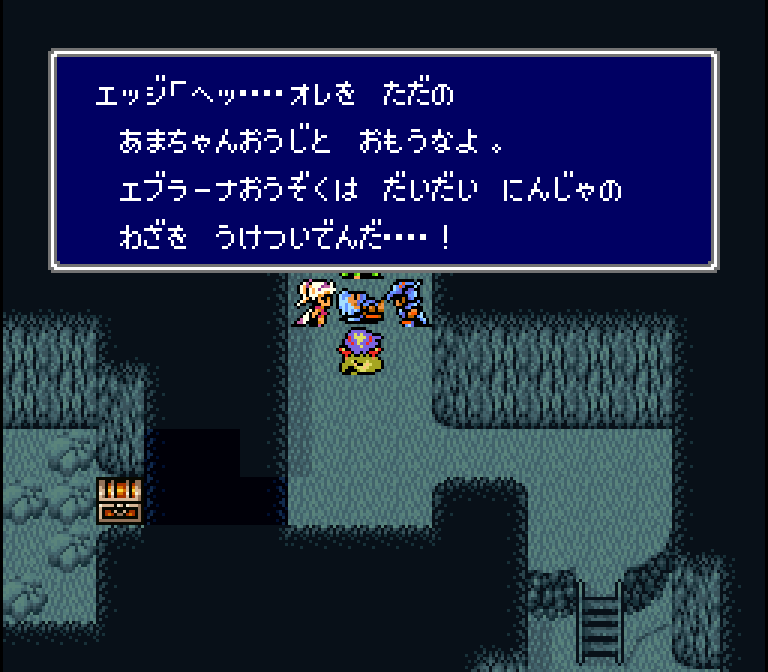 | 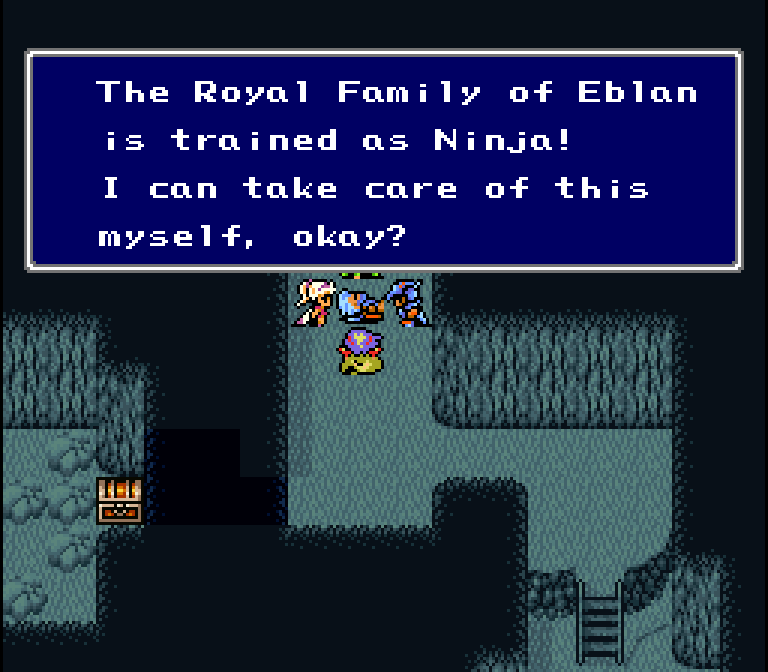 |
| Final Fantasy IV (Super Famicom) | Final Fantasy IV Easy Type (Super Famicom) | Final Fantasy II (Super NES) |
Secondly, we see that a quote about Rubicante being “the most powerful of the Four Heavenly Kings” had some basic rearrangement to make things a tiny bit clearer in the Easy Type script:
 | 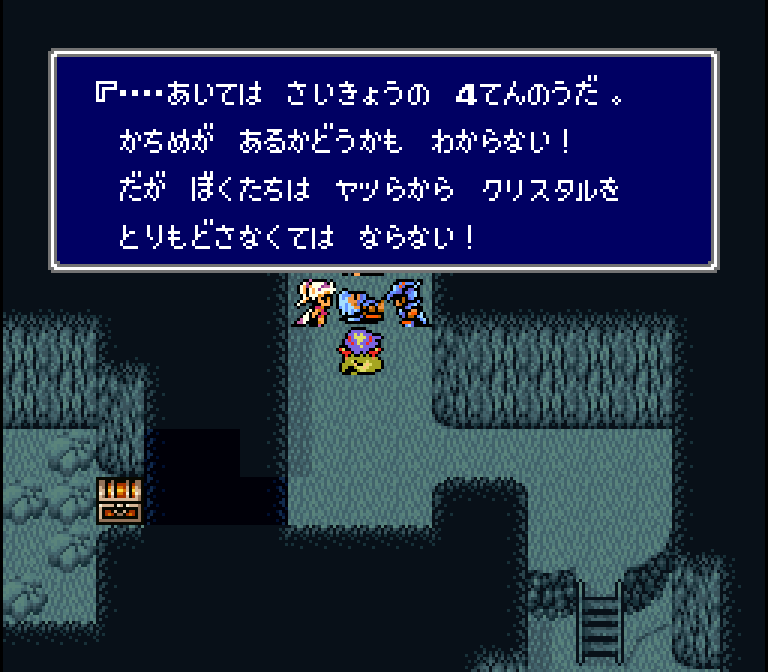 |  |
| Final Fantasy IV (Super Famicom) | Final Fantasy IV Easy Type (Super Famicom) | Final Fantasy II (Super NES) |
It’s difficult to explain the nuance difference here, but the phrase “strongest Heavenly King” – which appears at the start of the line – was reworded slightly into “strongest of the Heavenly Kings”.
Lastly, the original Japanese script includes an intentional spelling variation of きれー (kirē, "pretty"). This spelling variation was reverted back into the more standard きれい (kirei, "pretty") for clearer reading:
 |  | 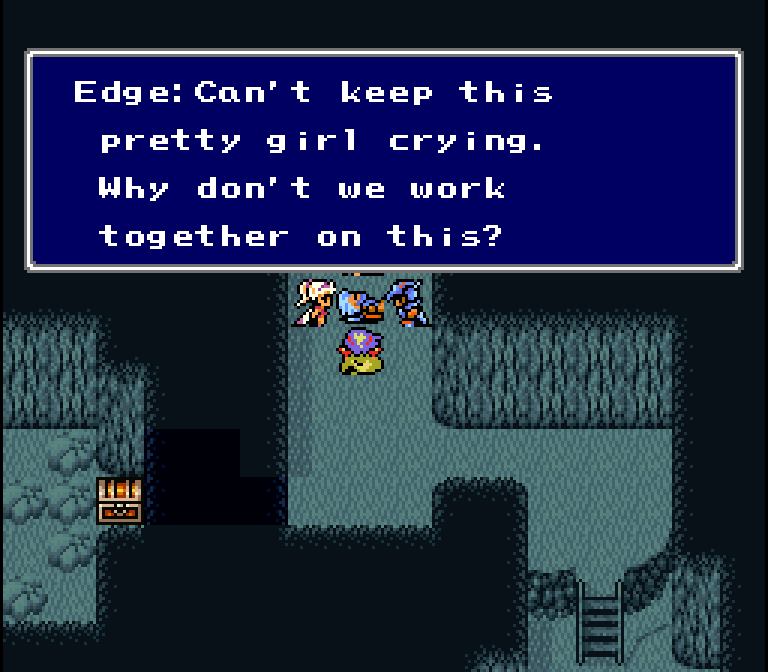 |
| Final Fantasy IV (Super Famicom) | Final Fantasy IV Easy Type (Super Famicom) | Final Fantasy II (Super NES) |
This intentional spelling change in the original script does provide some light “flavor” to Edge’s speaking style. It’s roughly kind of like if Edge had used the word “dunno” at first, and an editor fixed it later to say “don’t know” in a later release.
Chamberlain / Retainer
The old Eblana retainer guy has a new line if you return with Edge in your party:
 |  |
| Final Fantasy IV (Super Famicom) | Final Fantasy II (Super NES) |
In the English translation, he says, “We will hold out here.” but in the Japanese script, it’s actually, “I will take care of things here for you!”. Perhaps this text simplification is another reason why I never fully noticed that this guy is the same guy that nags Edge throughout the rest of the game.
Enthusiastic Guard
The guard at the entrance to the cave also has a new line once Edge is in your party:
 |  |
| Final Fantasy IV (Super Famicom) | Final Fantasy II (Super NES) |
| Japanese Version (basic translation) | English Translation |
| Show them just how sharp your ninjutsu skills are, Young Master! | Our Prince is a great Ninja! |
In Japanese, it’s common to refer to the listener in the third person, kind of like if you were talking about the listener while the listener wasn’t in the room. Normally, a translator will pick up on this and convert it back into the second-person when necessary.
This third-person vs. second-person thing seems to be why this guard talks about Edge in the third-person when he’s right there in your party. The translation also trimmed the guard’s line down so much that the line took on a new meaning too.


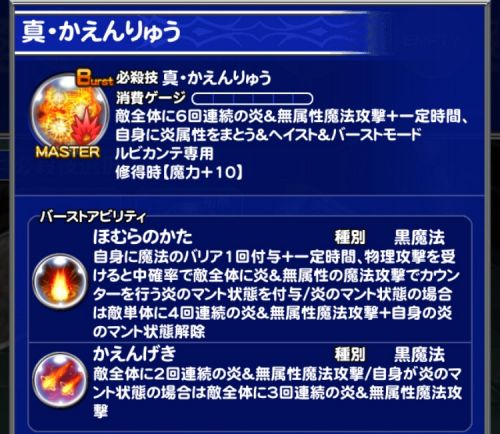
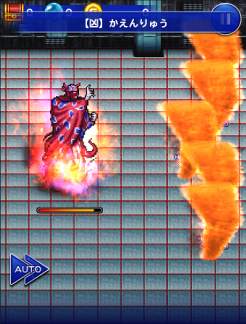
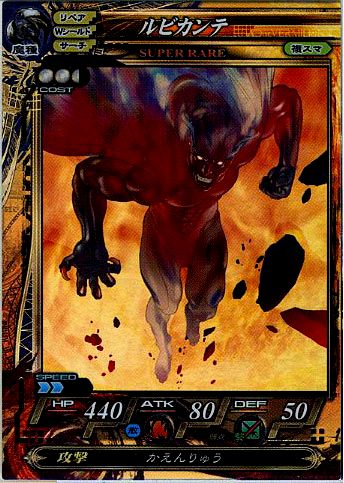
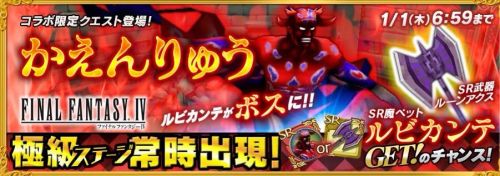
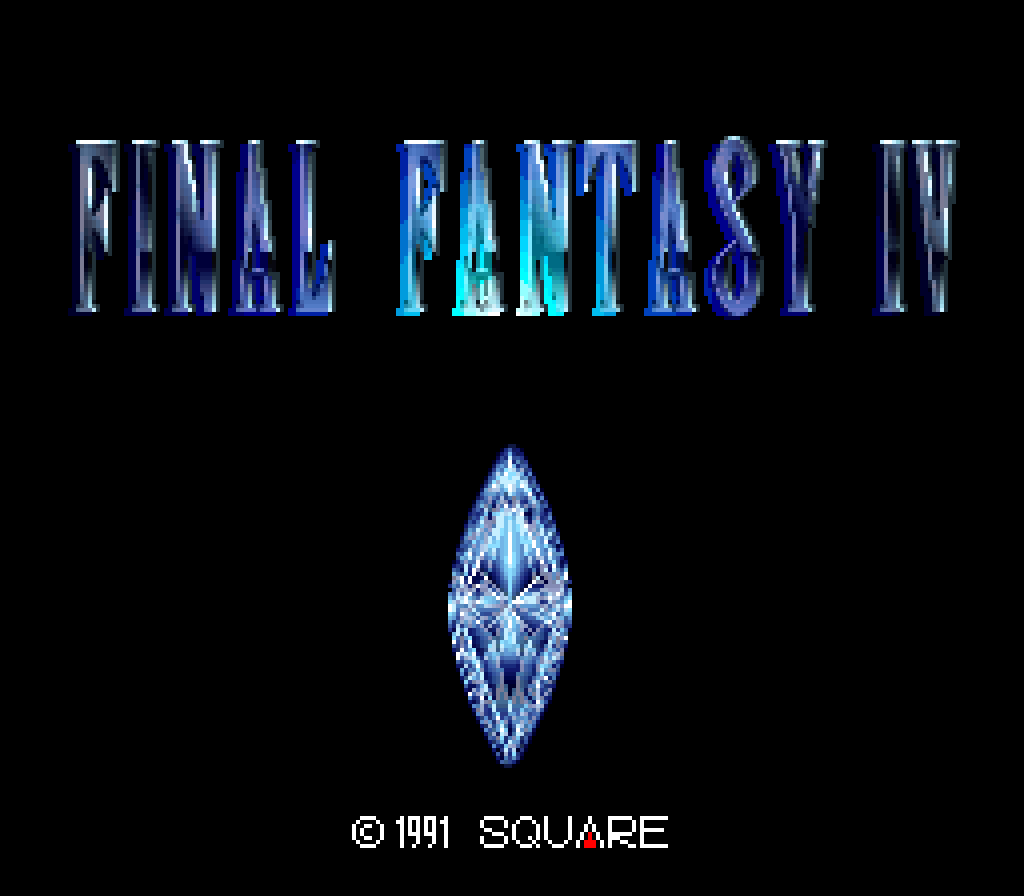
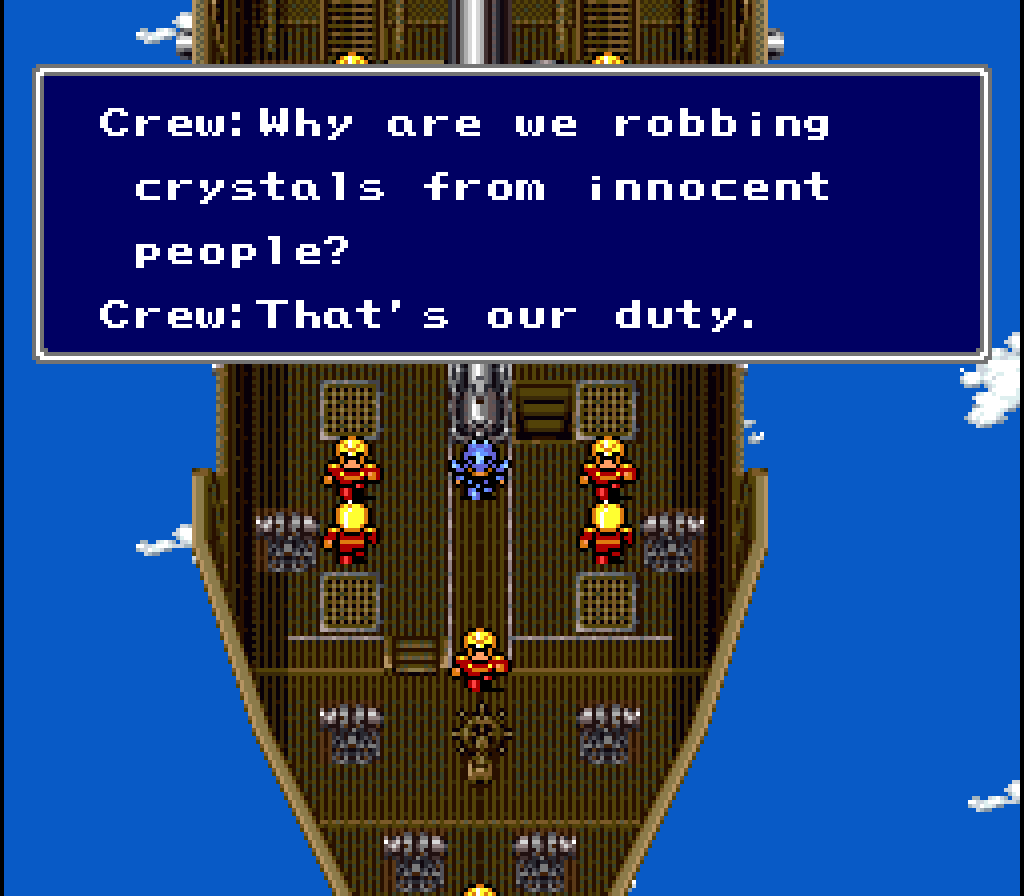
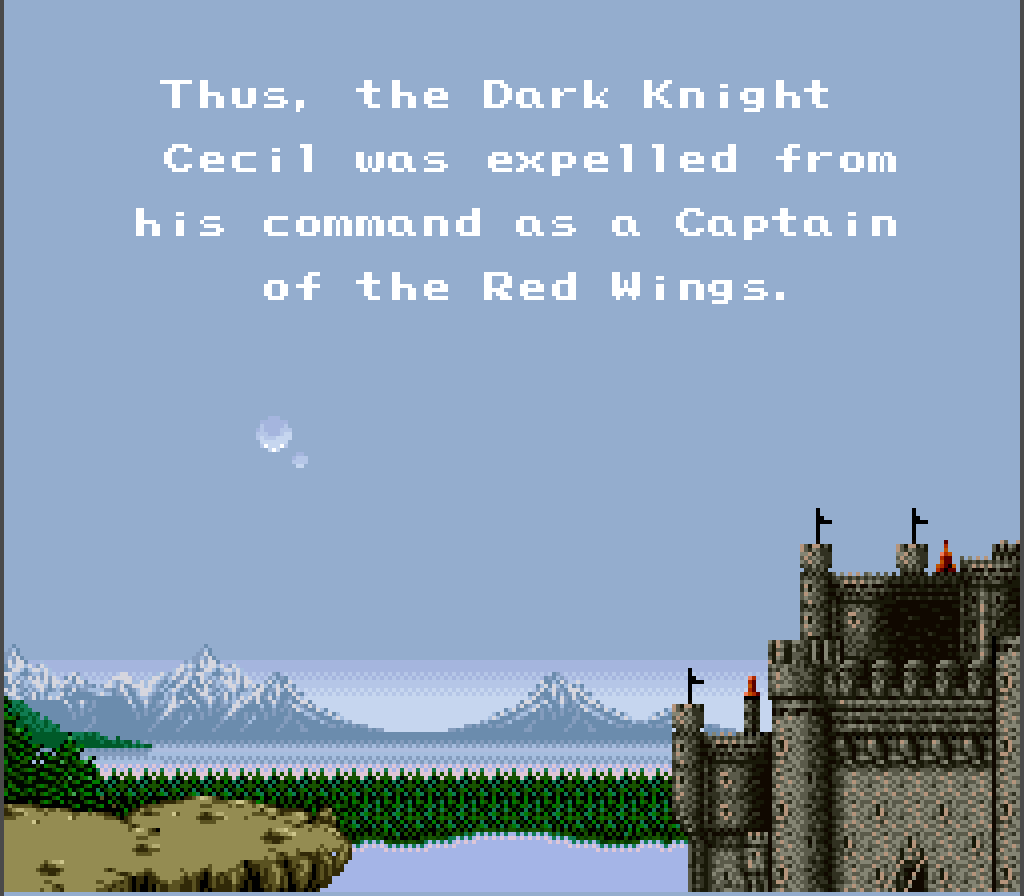
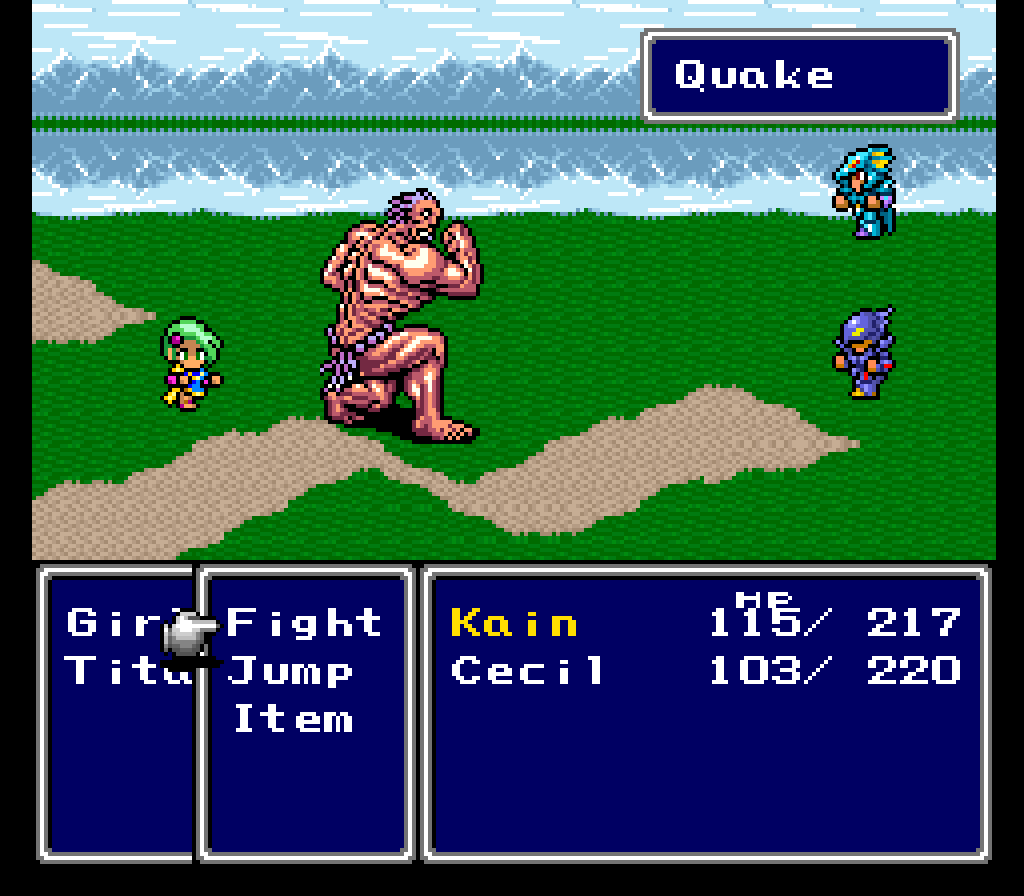
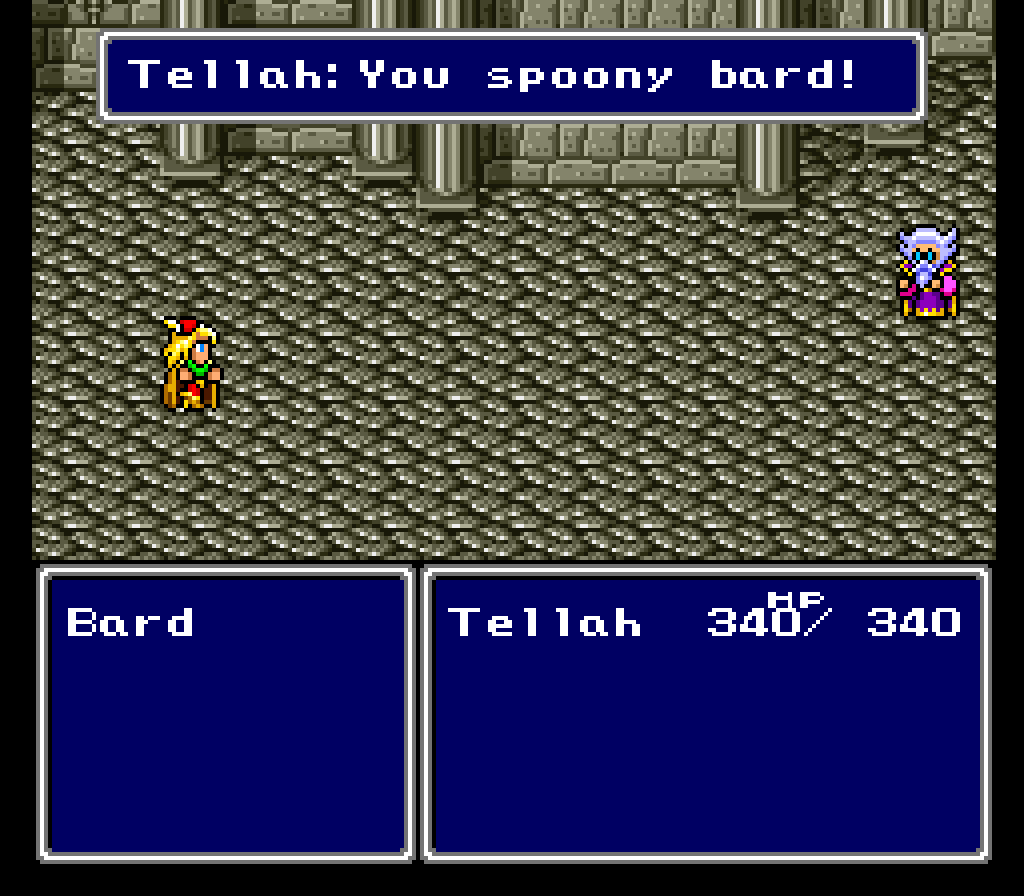
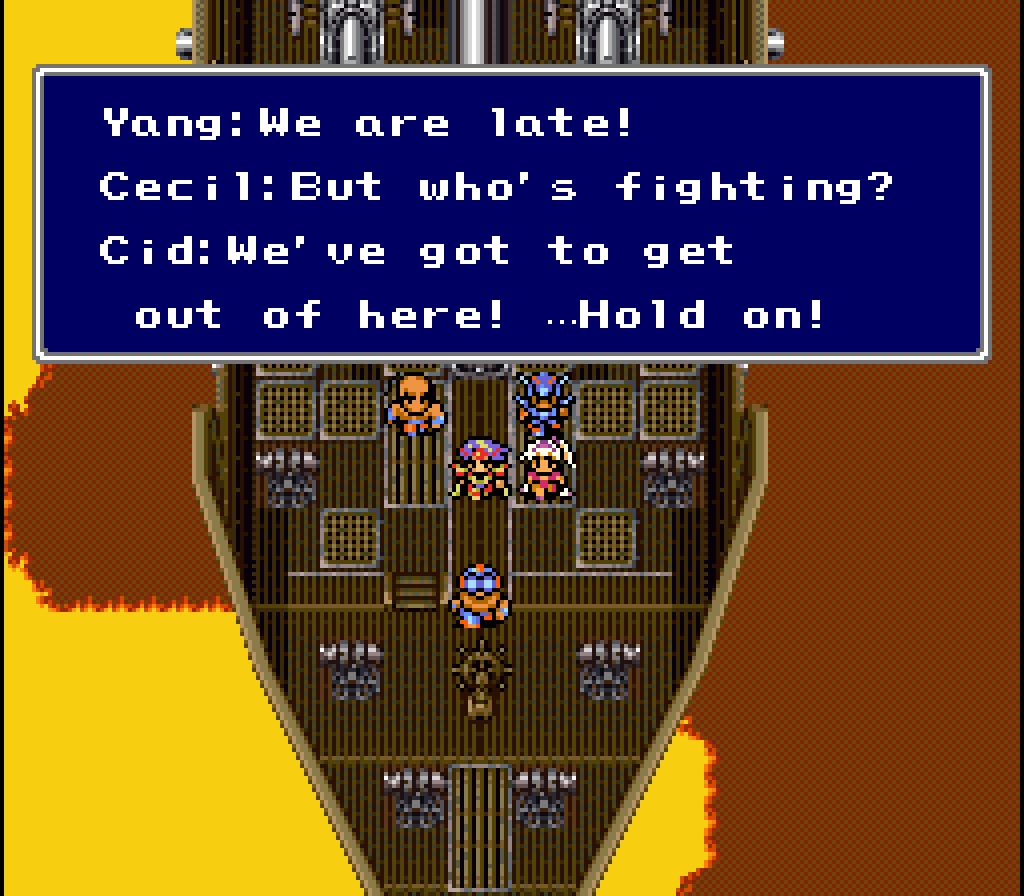
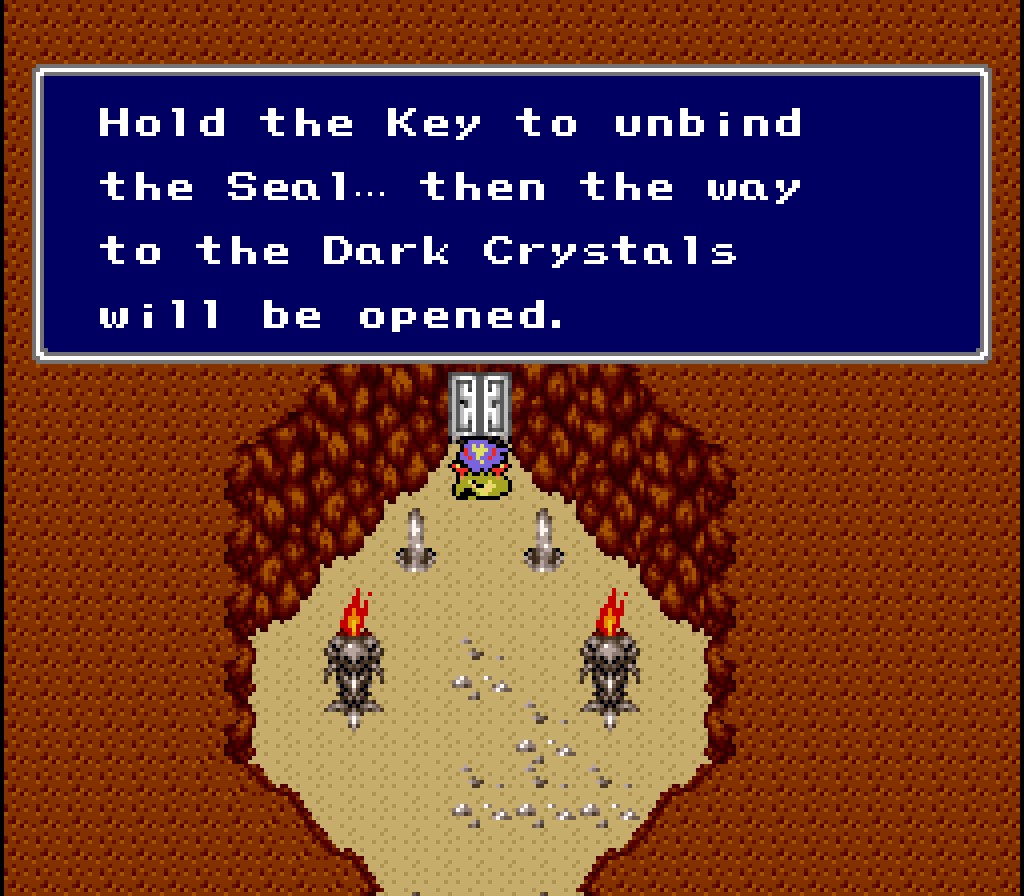
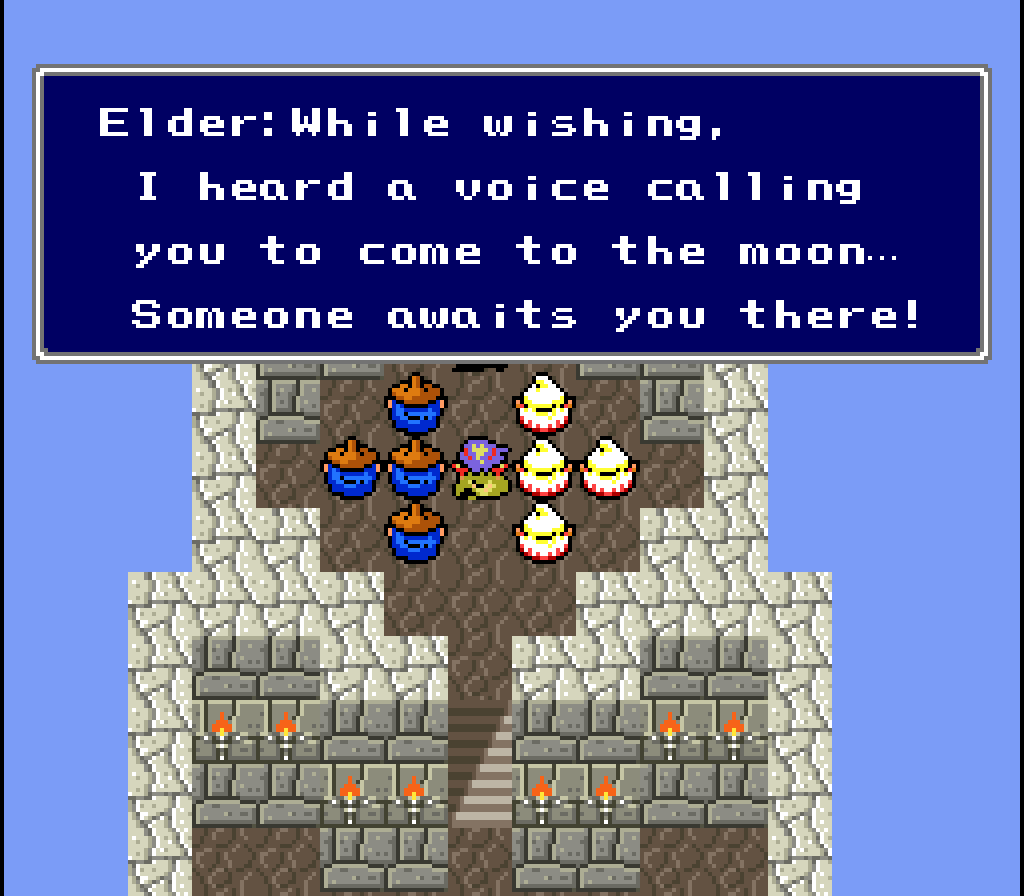
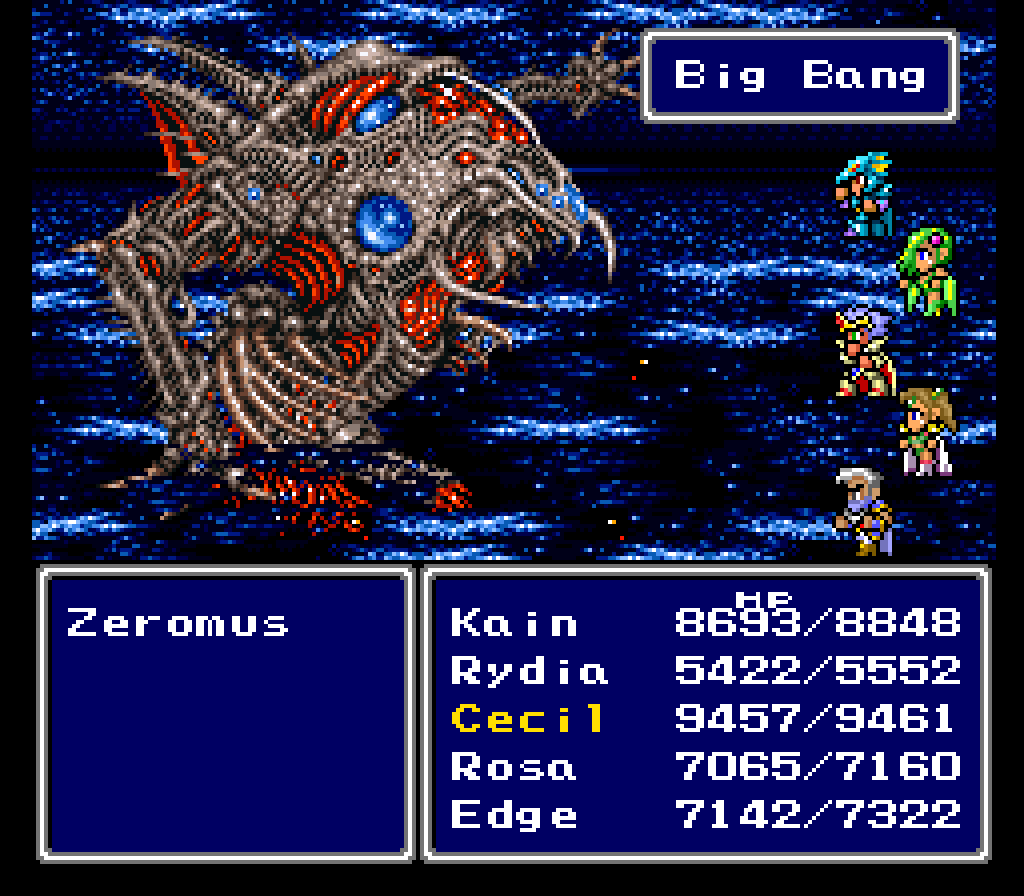
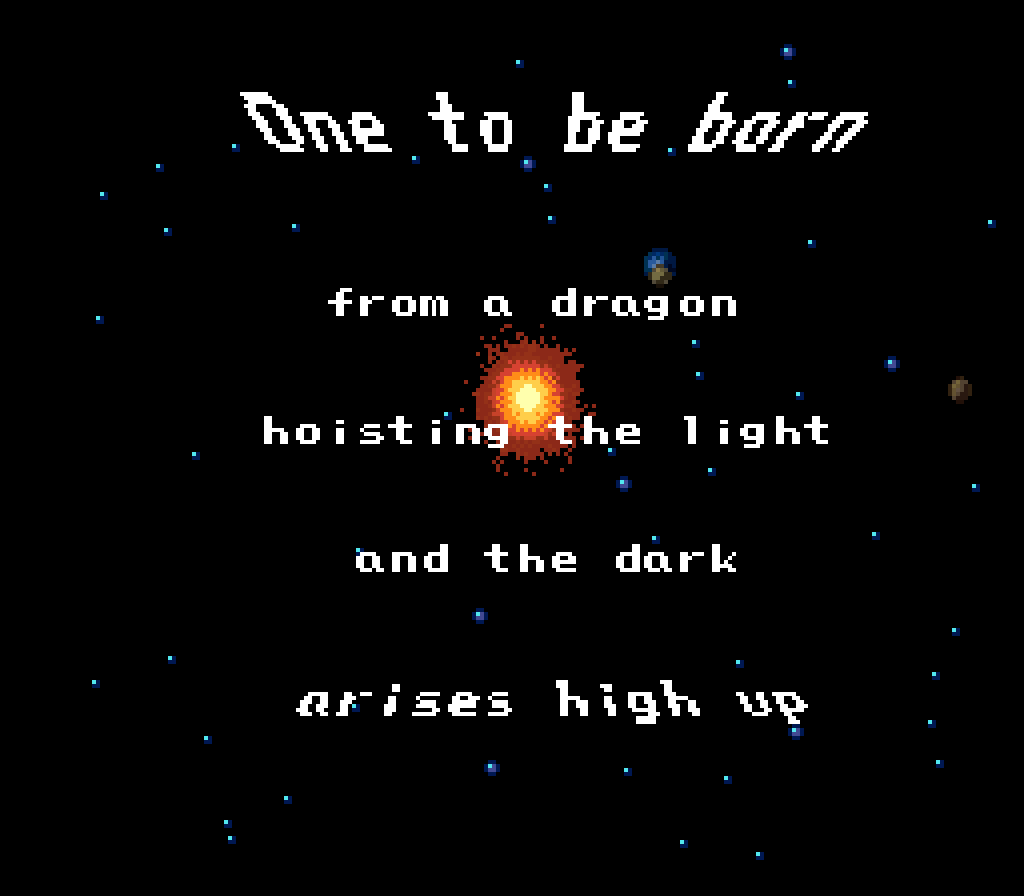
![press start to translate [Final Fantasy IV] press start to translate [Final Fantasy IV]](https://legendsoflocalization.com/wp-content/uploads/2018/05/pressstart.jpg)
No Comments